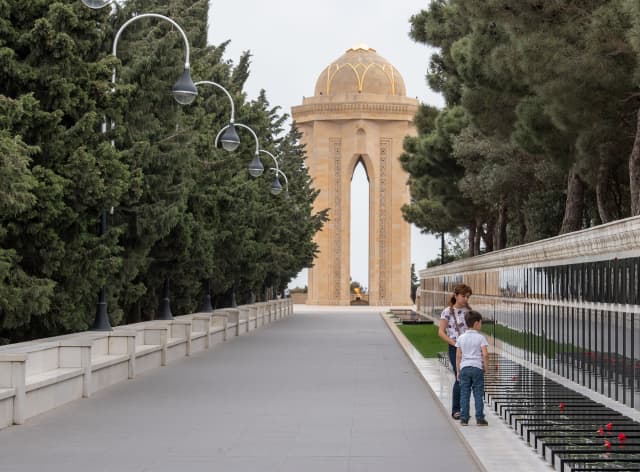As you enter Martyrs’ Lane high above the city, their tomb — together — is the first you see, deliberately so, a national symbol of enduring love and faith. Every country needs an origin story. The modern Azerbaijan story unfolds in Martyr’s Lane.
On January 20, 1990, Soviet tanks and troops rolled into Baku. Civilians, unarmed, were shot, point-blank, on the street. To this day, casualty figures — in the hundreds — remain in dispute.
Black January marked the beginning of this nation’s independence: Azerbaijan would proclaim itself independent in August 1991, just four months before the formal dissolution of the Soviet Union.
Martyr’s Lane, or as it is called in the Azerbaijan language, Shekhidlyar Khiyabany, is both a cemetery and a memorial. Also buried here are Turkish and British soldiers from fighting in 1918, and journalists from the Nagarno-Karabakh war.
The memorial sits on a bluff at the end of a busy street that holds, on one side, a slew of government ministry buildings and, on the other, the ultra-modern Flame Towers.
Even so, down a long walkway and up 18 stairs, past a botanical garden with flowers in bloom and butterflies dancing in the sunlight on the last day of summer, the noise of the city is gone. All is still.
Lined up against a white wall are more than 150 black marble tombs. These are those who died on January 20, 1990. The etchings of their faces — their eyes in particular — are incredibly vivid, almost lifelike. After the newlyweds come the young and the elderly, in some cases immediately next to each other. Rafik Orucov was probably just 15. His date of birth is listed merely as 1974. Sureyya Babayeva was 76, maybe 77. Hers says she was born in 1913.
The lane leads to an eternal flame, where visiting dignitaries often lay a wreath. Among them: Russian president Vladimir Putin, in 2001.
Beyond the flame is the Azerbaijani story, now: a commanding view of the Caspian Sea, the Baku Bay shoreline teeming with gleaming new buildings, the past just behind, the future out there, still.
Alan Abrahamson is an award-winning sportswriter, best-selling author and in-demand television analyst. In 2010 he launched his own website, 3 Wire Sports (www.3wiresports.com). From 2006 until 2010, Alan served as columnist at NBCOlympics.com, NBCSports.com and UniversalSports.com. For the 17 years before that, he was a staff writer at the Los Angeles Times; he spent his first nine years at the newspaper covering news and the final eight sports, mostly the Olympic movement. The 2016 Rio Games marked his ninth Olympics, Summer and Winter; he is a member of the International Olympic Committee's press committee.



